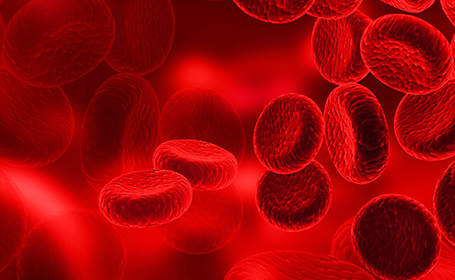
Blood Cancer: Types, symptoms and treatments
Consultant haemato-oncologist Dr Premini Mahendra, from The Priory Hospital in Birmingham, answers some of the most frequently asked questions on blood cancer
What is blood cancer?
Blood cancer is a general term covering many different types of cancers that affect the blood, bone marrow and immune system. The most common types of blood cancer are leukaemia, lymphoma and myeloma.
What are the different types of blood cancer?
We currently recognise around 150 specific types of blood cancer. As well as leukaemia, myeloma and lymphoma, chronic myeloproliferative diseases and myelodysplastic disorders are some of the most common groups.
Many types of leukaemia exist, some of which are more common in adults and some of which are most common in children.

Leukaemia blood cancer
Leukaemia is a cancer that affects the body's blood-forming tissues, including the lymphatic system and bone marrow. It generally affects the white blood cells, and is often considered a cancer of the white blood cells.
White blood cells fight infection in the body and are necessary to keep you healthy. These cells normally grow in a regular way, but in people with leukaemia, they grow abnormally and don't function properly.
Many types of leukaemia exist, some of which are more common in adults and some of which are most common in children.
Lymphoma blood cancer
Lymphoma is a cancer of the lymphatic system, a complex network of tubes (the lymph vessels) and glands (lymph nodes) that contain a fluid called lymph.
As well as carrying nutrients to cells, the lymphatic system helps to drain waste and excess fluid from your body.
The lymphatic system is part of the body's biological defence against infection. The lymph nodes are an important part of this immune system. They contain large numbers of lymphocytes, which are special types of white blood cells that help our bodies to fight infection.
If you have lymphoma, some of your lymphocytes become out of control and start to divide in an abnormal way, or don't regenerate as they should.
Myeloma blood cancer
Myeloma (also called multiple myeloma) is a cancer of the plasma cells in your bone marrow. The bone marrow is where blood cells are produced. It's the 'spongy' material found in the centre of the larger bones in the body.
Plasma cells are a type of white blood cell that form part of your immune system. While normal plasma cells produce antibodies to help fight infection, with myeloma these plasma cells become abnormal, and start to multiply in an uncontrolled way.
If cells become abnormal, they release a single type of antibody - known as paraprotein, M protein or immunoglobulin - with no useful function. And it's often by measuring the level of this paraprotein that myeloma is diagnosed and monitored.
Myeloma is not like other cancers. It doesn't show as a lump or tumour, for example. And most of the problems related to myeloma are caused by a build-up of the abnormal plasma cells and paraprotein in the blood or urine.
What are the symptoms of blood cancer?
There are many different symptoms that can be caused by blood cancer, including:
- Tiredness
- Fevers
- Drenching night sweats
- Unexplained weight loss
- Bruising
- Bleeding
- Recurrent or unusual infections
- Enlarged lymph glands (lasting for more than four weeks)
- Bone pain
- New or different back ache
However, these symptoms are not specific, meaning there can be many other causes for them. None of these symptoms are unique to blood cancer. They can all potentially be caused by completely different and benign issues.
If you have any of the above symptoms (without a clear cause), it's important to see your GP as soon as possible so that anything serious can be ruled out.
What are the causes of blood cancer?
Despite major advances in the treatment of blood cancer, we still don't know for certain what causes it.
Lifestyle factors do not seem to play a large role in causing blood cancer, however having a healthy lifestyle is extremely important. The healthier you are, the better able you will be to cope with the cancer and treatment for it.
Who is most at risk of blood cancer?
Although it's very rare that we can pinpoint the cause of a blood cancer, there are a number of risk factors we know about.
With the exception of acute lymphoblastic leukaemia, which is one of the commonest cancers in children, the risk of developing blood cancer increases with increasing age. Blood cancer can affect people of any age, but becomes more likely the older you get.
We also know that men are slightly more likely than women to develop blood cancer.
Other factors include genetics, chronic infection or inflammation, suppression of the immune system, previous exposure to chemotherapy and radiation, and pre-existing blood disorders (including other types of blood cancer).
There are some differences between different racial groups which might be due to both genetic and environmental factors.
Lifestyle factors do not seem to play a large role in causing blood cancer, however having a healthy lifestyle is extremely important. The healthier you are, the better able you will be to cope with the cancer and treatment for it.
How is blood cancer diagnosed?
First, it's important to take a full medical history and carry out a physical examination. Then, diagnosis is usually made on the basis of blood tests, bone marrow biopsy and CT or PET scans.
Biopsy of an affected lymph node or organ is sometimes necessary, especially in suspected lymphoma.
What treatments are available for blood cancer?
We are very fortunate that there has been huge process in the treatment of blood cancers in the last 50 years. Many cancers are highly treatable.
Blood cancer treatment usually involves chemotherapy. Some patients may need radiotherapy, and some may also require a stem cell transplant.
Unfortunately, in spite of all this progress, many blood cancers remain incurable at present.

Tags
How do I book an appointment?
If you're concerned about symptoms you're experiencing or require further information on this subject, talk to a GP or see an expert consultant at your local Circle Hospital.